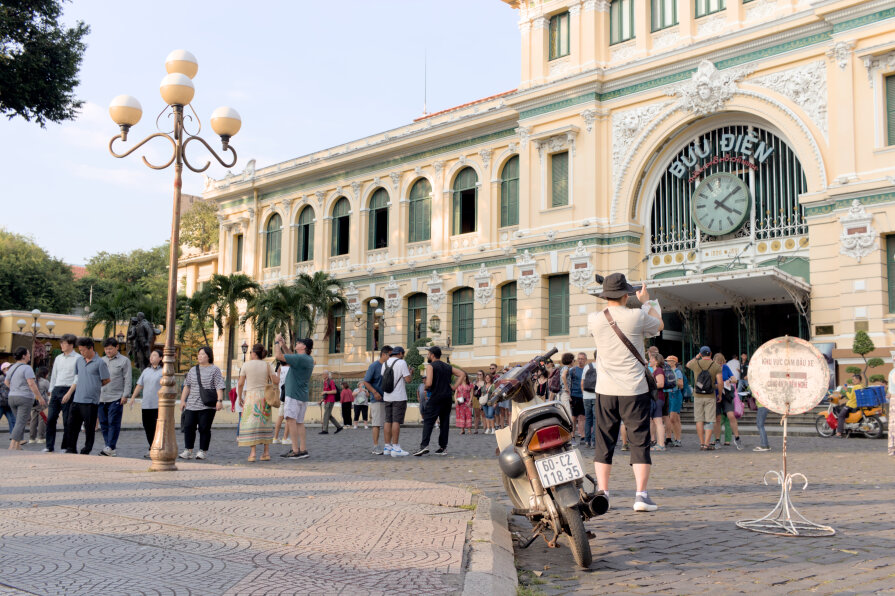The Simple Beauty of Vietnamese Language
After studying Vietnamese language for five months, I think that it is a challenging language to learn for Westerners. Especially the vocabulary with different tones is extremely hard to master: Bạn bận bán bàn bẩn không?, if you want to ask if someone is busy selling dirty tables. All joking apart, other features of this language are way simpler than you might expect.
 Saigon Central Post Office in Ho Chi Minh City
Saigon Central Post Office in Ho Chi Minh City
It is an isolating language
Isolating languages do not combine words. Vietnamese words can therefore not be broken up into different components with different meanings. Moreover, Vietnamese words are very short, as they mostly consist of only one syllable.
The longest word in Vietnamese language is seven letters long. It is “nghiêng” which means “inclined” or “to lean”, in case you are wondering.
The nature of an isolating language enables the Vietnamese to use multiple words in order to address things. This makes it easy to understand definitions of unfamiliar phrases and it is fun to guess their origin! Some examples I would like to share:
| thang | ladder |
|---|---|
| thang bộ | ladder to walk on (stairs) |
| thang máy | ladder machine (elevator) |
| thang cuốn | rolling ladder (escalator) |
| xe | vehicle |
|---|---|
| xe máy | vehicle machine (motorbike) |
| xe đạp | vehicle to kick (bicycle) |
| xe hơi | vehicle with gas (car) |
| xe lưa | vehicle with fire (train) |
| xe khách | vehicle with customers (bus) |
Forget about plural forms
There is no need to use plural forms of nouns. Ordering one or many beers, the Vietnamese like to keep things simple.
| bia | beer |
|---|---|
| không bia | zero beer/no beer/without beer |
| một bia | one beer |
| hai bia | two beers |
| hai mươi bia | two ten (20) beers |
However, in some situations, it might be desirable to clarify if you mean one or many. In these cases, you add các, which is a pluraliser.
| chị | miss |
|---|---|
| chào chị | hello miss |
| chào các chị | hello multiple miss (hello ladies) |
No grammatical conjugation
In Vietnamese grammar, it does not matter who did something at what point in time. Just add a word to indicate if it happened in the past or is going to happen in the future.
| Ngày mai Tomorrow |
tội I |
sẽ (future) |
đị go |
sieu thị supermarket |
| Hom qua Yesterday |
họ they |
đã (past) |
đị go |
sieu thị supermarket |
As you can see, the verb đị (to go) does not change at all. Maybe someone needs to show the Germans.
Numbers tell the tale
Names can be confusing. Especially in Dutch, where we have two sequential months named juni and juli. The Vietnamese must have been thinking: why would we come up with names if we can be using numbers anyway?
| tháng | month |
|---|---|
| tháng một | month one (January) |
| tháng hai | month two (February) |
| tháng ba | month three (March) |
| … | … |
| thứ | indication of rank |
|---|---|
| thứ hai | the second (Monday) |
| thứ ba | the third (Tuesday) |
| … | … |
Some interesting, but less convenient features
The fact that surprised me most is that there are some basic words missing in Vietnamese language. There is no separate word for the color green and the color blue. This got me into a weird situation when I hired a graphic designer that (apparently) used Google Translate to translate my requests. The Vietnamese just add more words to make their meaning clear.
| xanh | blue/green |
|---|---|
| xanh da trời | blue/green like the sky (blue) |
| xanh lá | blue/green like a leaf (green) |
On the other hand, I find it interesting that are phrases in Vietnamese that do not exist in English or other languages that I am familiar with. For example, they use different phrases for grandparents on each side of the familiy.
| ông bà | grandparents |
|---|---|
| ông bà ngoại | grandparents outside (mother’s side) |
| ông bà nội | grandparents inside (father’s side) |
The traditional idea in Vietnam is that if a couple gets married, the wife moves in to the family house of the husband. Therefore, the grandparents inside the house are always the parents of the husband. The outside grandparents are the parents of the wife.